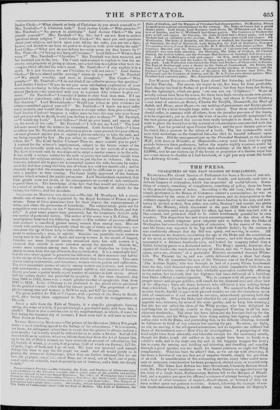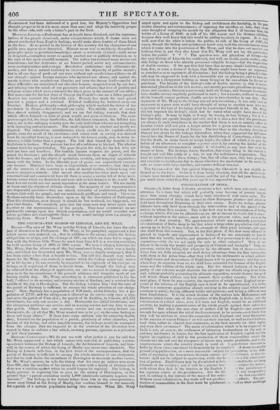THE PRESS.
CHARACTERS OF THE PAST SESSION OP PARLIAMENT.
Exameseo—The closed Session of Parliament has been a Se,ielit of one act. The Legislature achieved a single measure of benefit, and instantly sunk into a delicate languor of exhaustion, which has suspended all useful labours. Some- thing of conceit, something of compliment, something of policy, there has been in this general abeyance of action. According to the old story, when the good simple gentleman in the House of Commons uttered a commonplace, he was so overwhelmed by the sense of his own performance, and its disproportion to the ordinary capacity of mortal man, that he sunk down fainting in his seat, and mut- tering in modest ecstasy, Non nobis, non nobis, Dominic ! sod nomini tuo glom detur.The Ministry, which discovered in the year 1828 that a belief in the Catholic religion need not disqualify for office, has been a little touched with a like conceit, and permitted itself to be rather inordinately grateful for its own wonders. 'file disposition has met every encouragement. At the close of the last Session, certain symptoms gave sanguine men to believe that the Duke of Wellington had conceived the principle of toleration. In the course of the sum- liter his Grace was reported to be big with Catholic Relief ; by the autumn it was confidently affirmed that the Bill was quick, and moving, in ventre. All these rumours we doubted, considering the age of the Duke and the constitution of his mind, as inferred from his past political career ; and with these regards we accounted it a Johanna Southcote case, and looked for tympany rather than a Shiloh bringing peace to a distracted nation. The King's speech, however, dis- sipated all doubt—the words were the cry of labour, and the " Juno Lucina, for open], servo me, obsecro," of a parturient Minister, resounded through White- hall. 'File Premier lay in, and was safely delivered after a short but sharp labour. We all rernernber the case of the Princess, one of the Four Sisters, in 'The Arabian Nights,' who was brought to bed of a young Prince handsomer than the day, with diamond eyes and silver hair, which remarkable birth the ma- levolent and envious sisters of the lady wickedly concealed, confidently affirming to the sultan, her husband, that her highness had been delivered of a brickbat. Our Duke suffered a similar injustice. We, in common with all persons in their proper senses and proper politics, will vouch for the diamond eyes and silver hair of his oir.spi ing ; there are those, however, who still insist it was nothing better than a brickbat. Up to this period, all was well. We rejoiced to find the Duke another Sarah, fruitful in age—with pleased wonder we saw the truncheon, mere stick of command as it nad seemed in our eyes, miraculously sprouting forth the greenest myrtle. When the Duke had afforded his one good produce, die oatural appetite was, however, for more of the same quality, and to keep hint teeming ; but this hits not suited the ideas of the Whig gossips, who have delighted in coddling him to inactivity, exactly as they pampered Canning in all his mis- chievous tendencies. The straw has been down and the knocker tied up for the whole Session, and the Whigs have been doing nothing but sipping caudle and eating cake with the Duke, and pretending that, in his delicate situatiop, it would be barbarous to think of any concern but nursing the pet. No noise, no light, no stir, no moving, is the whispered admonition, and no inquiries are suffered but those of the tenderest sort—' How d'ye do' investigations. A pampering of this kind might have been allowable and tolerable enough for the customary month, though the Duke, tough old soldier as he is, might have been as hardy as a soldier's wife, and in the straw one day and in the baggage waggon the next ; but to carry the nursing and fondling and deferring and dawdling and maudlin through a good quarter, was too much for human patience, or aught but Whig complacency. What has been the effect that, as we set out with observing, it has been a Session of one act, that act of negative benefit, simply the privation of an evil. In consideration of this exhausting service, every other useful mea- sure or necessary consideration has been postponed, slurred over, or scandalously defeated. The Game Law Reform has been thrown out, Chancery Reform thrust over, Mr. Otway Cave's resolutious on West India Slavery unsupported even by the voice of a single Saint, Parliamentary Reform left to the Marquis of Bland- ford, and a negative put upon the affirmed existence of corrupt boroughs, together with a host of other instances of neglect, abandonment, or betrayal of duty we have neither space nor patience to recite. Indeed, following the example of cer- tain South-American Indians, it would almost seem that, because his Majesty's - Government had been delivered of a good law, his Majesty's Opposition had thought proper to lie in (in more sense than one) and adopt the inactivity proper to the other side, with only a father's part in the fruit.
MORNING JOURNAL—ParliaLlIent has at length been dissolved, and the represen- tatives of the people dismissed, under circumstances which, if shame were not almost eradicated from English feelings, would make three-fourths of them black in the face. At no period in the history of this country did the characters of our public men appear more degraded. Honour never was so recklessly discarded— principles never so prostituted—pledges never so wantonly violated—truth never so despised—corruption never so openly exerted nor so publicly defended, as is the case at this most eventful moment. The nation has endured many storms and • convulsions, but her statesmen at no former period, under any circumstances, were so characterless and corrupt. Revolution undermines and obliterates dy- 'pasties, and has a natural tendency to increase the depravity of public morals ; but in all our days of peril—of our wars without and our divisions within—in all our struggles against foreign enemies who menaced our shores, and against do- mestic traitors who assailed our liberties and even the throne itself—amidst all these difficulties we maiefaitted our chivalric honour, respected even by our foes, and infusing into the minds of our peasantry and artisans that love of probity and religious virtue which were esteemed the finest gems in the coronet of our nobles. But now—alas for the last clays of George the Pourth !—we are a fallen people ! Avarice has covered the land with vice. Poverty has made the once proud peasant a pauper and a crimilial. Political trafficking has bartered away our .fiberties. Modern philosophy—that philosophy which marked the dawn of the srevolution in Prance—has destroyed our trade. The middle ranks of society have almost entirely tlisappeared; and we are fast sinking towards that state Which afflicts Ireland—a state of great wealth and great destitution. The over- grown capitalist, the large fundholder, the full-blown sinecurist, the full-fed tax- eater, are in this unhappy country now the only individuals who are not struggling with increasing embarrassments. The small capitalist is crushed and nearly ex- tirpated. The industrious manufacturer, whose credit was his capital—whose profits were the result of his exertions—and whose rank in society was derived 110111 his unsullied honesty, is now reduced to the lowest grade, and, in many in- stances, is little better than a pauper. The link that bound the humble to the high-born is broken. The yeoman has lost all confidence in his lord. The elector cannot trust his representative. The poor despise the rich, for the few who are rich are base and trustless. The hunstle layman suspects his priest, and the priest his diocesan ; and the church stands between them an object of ridicule with the former, and the object of spoliation, venality, and temporal aggrandize- ment, with the latter. In the fifteenth year of peace our expenditure exceeds our income. Ministers have been so improvident, or so senseless, that they see all the interests of the country in a state of mortal decline, without being able even to suggest a remedy. One inroad after another has been made upon our constitutional and commercial laws till there is scarce a vestige left of those insti- tutions under which we flourished and were able to bid defiance to the world. We
• have lost our credit and our moral reputation at the same instant. We are needy at home and the objects of ridicule abroad. The majority of our representatives are disgraceful apostates—they are utterly unworthy of confidence—they have broken faith with the people, and are notoriously profligate and venal. These re- flections naturally force themselves upon us by die dissolution of Parliament. That this dissolution, even though it. should be but sessional, has happened, we give God thanks. We earnestly pray that the same men may never again meet together as the representatives of the people. They have committed an un- • pardonable outrage upon the British constitution, and we would consider our- selves spiritless and contemptible slaves if we could indulge even the charity of forgiving them. Never ! Never!



















 Previous page
Previous page